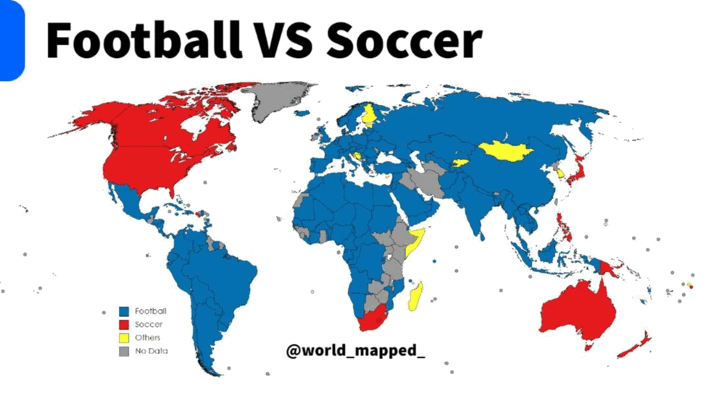 English people hearing an American refer to football as ‘soccer’ will often act as though they’re appalled, laughing at the idiocy of someone not from this country failing to refer to the sport as ‘football’. Those that know what they’re talking about feel slightly ashamed of this reaction, not least because of TV programs, such as Soccer Saturday and Soccer AM, which English audiences have lapped up for years without ever stopping to think about why it is that the word ‘soccer’ appears in their titles when so many abhor it.
English people hearing an American refer to football as ‘soccer’ will often act as though they’re appalled, laughing at the idiocy of someone not from this country failing to refer to the sport as ‘football’. Those that know what they’re talking about feel slightly ashamed of this reaction, not least because of TV programs, such as Soccer Saturday and Soccer AM, which English audiences have lapped up for years without ever stopping to think about why it is that the word ‘soccer’ appears in their titles when so many abhor it.
It isn’t only in America where football is referred to as ‘soccer’, of course. There are numerous countries around the world that call it that, with Australia and New Zealand also on the list. The problem is that Americans are regularly thought of as being ignorant and arrogant, meaning that the fact that those from North America call is ‘soccer’ is something that annoys English people. You would think after Brexit that the English would learn to wind their necks in over arrogant decisions, yet still an American accent referring to something as soccer will warn disapproval.
The Origins & Reasons Behind the American Use of the Term “Soccer”

The sport that the majority of the world knows as football, a game played with a round ball using your feet, is referred to as ‘soccer’ in the United States of America, as well as other parts of North America and the likes of Australia and New Zealand. This linguistic discrepancy has puzzled many, considering the fact that the sport is wildly popular worldwide. To understand the American usage of the term, it is crucial to examine the historical context in which the sport developed in the United States. The origins of soccer in America can be traced back to the late 19th century.
At the time, various forms of football were emerging around the world. During this period, both rugby and association football were gaining popularity in Britain. A significant influx of British immigrants to the United States during the late 19th and early 20th centuries played a crucial role in introducing the game to American soil. However, the term ‘football’ was already associated with a different sport in the US, which is the sport that British people tend to call American football. To avoid confusion between the two sports, it became necessary to differentiate them linguistically.
Ironically, the term ‘soccer’ actually has British origins, evolving from the formal name of the sport association football. In the late 19th century, adding the suffix of ‘er’ to abbreviations was a common linguistic practice in the country. One such example is that of ‘rugger’, which emerged as a shortened form of rugby football. It makes complete sense, therefore, for ‘soccer’ to be used instead of the full version of the sport. Why say ‘association football’ when ‘soccer’ is shorter and easier to say? As a result, ‘soccer’ was used interchangeably with ‘football’ throughout Britain when discussing the sport.
‘Football’ Dominates in the UK

As the sport grew in popularity, the term ‘football’ became the dominant term used by people in the United Kingdom. This left ‘soccer’ behind as a secondary term. This shift did not occur in the United States, however, as ‘football’ had already been established as the name for the sport of grid iron. After all, it wouldn’t make sense for Americans to call that ‘American football’ any more than it would for people in the UK to refer to ‘English football’. Thus, the two countries had their own dominant sports that were known as football but were extremely different from each other.
Apart from the historical context, cultural factors also influenced the American usage of the term ‘soccer’. The United States of America has a diverse sporting landscape, with American football, basketball and baseball occupying prominent positions. These sports have deep-rooted traditions and enjoy significant popularity throughout the country, meaning that their titles were all but set in stone before what we know as football was properly introduced to the US. As a result, ‘soccer’ struggled to gain mainstream attention and had to compete with the already established sports.
Finding Its Place in the American Sporting Landscape

The American sports lexicon was dominated by existing terminologies, meaning that ‘soccer’ had to find its place within this framework. As a result, the term became entrenched to differentiate the sport from American football and other sports. Additionally, the influence of media played a role in solidifying the term ‘soccer’ in the American consciousness. The American media used ‘soccer’ to help to differentiate the sport from other codes of football, contributing to its widespread adoption. The use of the term in media coverage, broadcasting and commentary further ensured its place within American sporting culture.
That ‘soccer’ had also been widely used in the United Kingdom doubtless also meant that many in the United States were confused when they began to be corrected on their usage of the term. Just as many in the UK would be judgemental of someone referred to rugby as ‘rugger’, so too are the British quick to decide that the usage of ‘soccer’ is a sign of someone who doesn’t know what they’re talking about. You can be as knowledgeable as they are about the sport, but if you use the term that was abandoned in the United Kingdom then you will be judged for doing so.
It Isn’t Just the United States

In spite what judgemental people in the United Kingdom might have you think, it isn’t just people in the United States of America who call the sport ‘soccer’. The usage of different terms for football around the world reflect the linguistic diversity and cultural nuances of each region in which a particular term is used. Whilst ‘football’ is the widely accepted term in the majority of countries, the use of ‘soccer’ in certain places is influenced by linguistic variations and historical context. Many, as with the US, will have had their own sports known as football before ‘soccer’ even arrived.

Canada, Australia & New Zealand
In countries where English is the primary language, such as the United States, Canada, Australia and New Zealand, the term ‘soccer’ has gained prominence to distinguish the sport from other forms of football. This is particularly relevant in countries where American football, Canadian football or Australian rules football are popular, as these sports already claim the term ‘football’ for their respective codes. Again, it would be odd for Australians to refer to football as ‘Australian football’ or Canadians to call it ‘Canadian football’ rather than just ‘football’ and call what the English call ‘football’ something else.
Non-English Speaking Countries
In many English-speaking countries, the use of ‘soccer’ helps to avoid confusion in conversations and during sports discourse. It allows for clear differentiation between codes and ensures effective communication amongst sports enthusiasts. On top of that, linguistic diversity within non-English speaking countries also contributes to the variation in football terminology. For example, in Spanish-speaking countries, the sport is commonly referred to as ‘fútbol,’ which is obviously derived from the Spanish word for football. Similarly, in countries like Brazil and Portugal, it is known as ‘futebol’.
This is reflective of the the linguistic conventions of the Portuguese language, whilst the variations also highlight the importance of considering the cultural and linguistic context when discussing football terminology. It emphasises the fact that language is not a fixed entity but a dynamic reflection of local customs and historical influences. The terminology used for football in each country is a product of the evolution of language and the specific sporting landscape of that region at the time that decisions were made about what to call the sport in the wake of it being imported.
South Africa & Ireland
It is also worth noting that the usage of ‘soccer’ in certain countries is not limited to English-speaking nations. In countries like South Africa and Ireland, for example, where Gaelic football and rugby hold significant cultural significance, ‘soccer’ is often used to distinguish the sport from these local codes of football. This showcases how the adoption of the term ‘soccer’ can occur in various linguistic and cultural contexts. The global reach of the sport has led to the establishment of international football competitions, such as the FIFA World Cup and continental championships like the UEFA European Championship and the Copa América.
These events bring together teams from different linguistic backgrounds, further highlighting the diversity of terminology within the football community. Whilst linguistic variations in football can sometimes lead to confusion or debates amongst fans and linguists, they also serve as a testament to the rich cultural tapestry and global nature of the sport. Understanding and respecting these differences of language can foster cross-cultural appreciation and enhance communication in the global football community, which can be crucial at a time of divide.
Does It Matter?

The question that many people criticising those who call the sport ‘soccer’ fail to ask themselves is whether it even matters. The reality is that football fans face countless things that divide them without focusing on the word used to talk about it. When Liverpool fans were mistreated by the French police at the Champions League final in 2023, rather than express concern for them supporters of other clubs made a joke out of it and blamed the supporters for what had happened. A year later, Manchester City fans then experienced a terrible time when attending the Champions League final themselves.
A Universal Love for the Sport
If football supporters would like to see some sort of change occur to the way in which they are treated by the authorities responsible for the organisation of tournaments such as the Champions League, they need to come together rather than use tribal lines to segregate themselves. In many ways, therefore, the judgement that occurs when discussing ‘soccer’ as opposed to ‘football’ as the name of the sport is indicative of the problems that run deep for some sets of fans. People would rather criticise each other instead of being welcoming to new voices.
Rather than laughing at an American, Canadian or Australian for calling the sport ‘soccer’, football fans should instead be glad that they’re even interested in it in the first place. That is especially true when it comes to Americans, given the fact that they have plenty of other sports to choose from and could just as easily walk away from football in favour of basketball or baseball, should they be made to feel unwelcome. That might not matter to some, but ultimately a sport is only as important as its popularity suggests it is, so the development of it in other countries is important.
It Is What the Sports Represents That Truly Matters
Football fans will often talk of the sport as being universal, but then will also move to mock or make fun of those that use different language from them to talk about it. The joy of football as a sport is that it is one that is played all over the world, largely thanks to the fact that it is much more accessible than the likes of American football or baseball. Why does it matter what exact word it is that someone is using to describe it, provided they understand the basics of it and why it is that we all love it? Whether you’re talking about ‘soccer’ or ‘football’, it is what the sport represents that matters.
As supporters, we all need to be better at seeing the point of view of other people. We can’t let the fact that someone supports a different team or uses a different word to talk about it mean that their opinion is viewed as less important or their suffering isn’t a universal one. The debate over the word ‘soccer’ will rage on, but the the global perspectives and linguistic diversity surrounding football will contribute to its global appeal. This will allow new supporters to come to the sport and they should be welcomed with open arms, consigning division to the past.